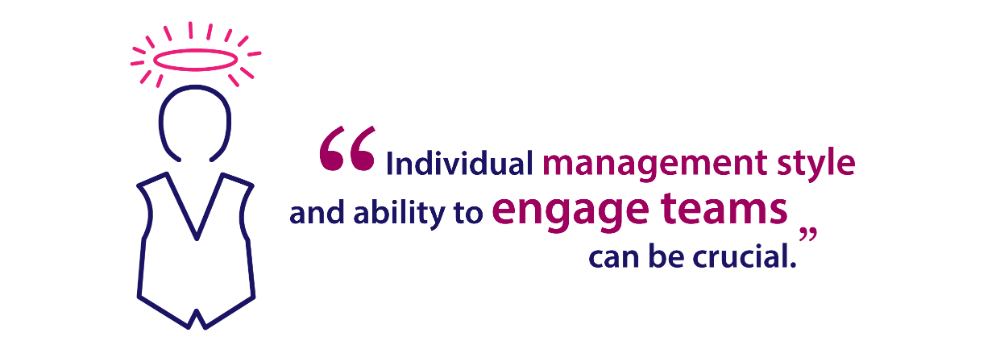
For many political party leaders, professional sports team managers and directors of numerous other organisations, the media spotlight is familiar ground, and people across the country regularly discuss and critique their management, leadership and engagement styles.
Indeed, it’s often said that managing the England men’s football team is the toughest job in sport as whoever holds the role is under constant media scrutiny and when things go badly they bear the brunt of the blame. However, when things go well it’s often the players who take the credit (although last summer’s World Cup did buck that trend with Gareth Southgate becoming something of a national hero).
While not all management roles are ‘up there’ in terms of their perceived national importance, they do all include the same basic elements of running a team and making sure the good times outweigh the bad. But is it fair for managers to take the rap when teams perform badly? You might expect highly paid football players to at least share the responsibility, but in the wider world of business, managers can make all the difference to getting the best out of employees – and their individual approach to leadership and ability to engage their teams can be crucial.
Why employee engagement is key to high performance
According to the Gallup State of the Global Workplace report published in 2017, 85 per cent of employees are either not engaged or are actively disengaged in their job.
The workplace report summarises a wealth of data on how effectively employers and countries around the world are using the human capital in their workforces. The researchers say that the low percentage of engaged employees shown is a barrier to creating high-performing cultures and implies a stunning amount of wasted potential.
They add that business leaders must recognise when traditional patterns in management practices, education or gender roles, for example, become roadblocks to workers’ motivation and productivity, and when selectively disrupting tradition with effective leadership styles will help clear a path to greater prosperity and transformed company cultures.
Jim Clifton, Chairman and CEO of Gallup, said: “Gallup analytics find that ‘There is someone at work who encourages my development’ is one of the best survey questions that separates enthusiastic, high-performing workers from low-performing, miserable ones.

How to deliver employee development and engagement
It’s up to managers to engage and develop teams, not CEOs, boards or centralised HR or communications teams (if you’re big enough to have them). The kind of engagement that encourages employees to grow and learn, to feel appreciated and to trust their employer doesn’t come from occasional team-building days or annual awards ceremonies; it comes from the ongoing efforts of managers to support and develop their teams.
No one size fits all either, and the type of leadership behaviours managers need will depend on the roles people are working in and the level of autonomy they have in their day-to-day work. Here are just a few things to consider if you want to improve employee engagement:
1. Can Laissez-faire management styles encourage ownership?
As a leadership model, laissez-faire leadership, otherwise known as delegative leadership, is not generally considered to be ideal for groups whose skill-set is in need of further development. For teams with high expertise and skill however, having the confidence to empower them to make decisions on their own can have huge long term benefits. For example, you can involve staff in planning and strategy so that they understand and support what they are doing and why. Laissez-faire leaders shouldn’t be afraid to call on the expertise of their team, and in turn improve their connection with and ownership of their work. Supporting team members to have a say in the business decision making process or how work is done will also help organisations identify their up and coming leaders and think about succession planning.

Democratic leaders who can focus their team on change and improvement can inspire individuals and help their organisations to grow, even in challenging times. Democratic management styles result in greater two-way dialogue between managers and employees, in particular with those employees who want a say in the decisions that affect their work, which can support shared ownership.
2. Help your leaders to share good practice
Managers shouldn’t be working in silos; while each part of an organisation will have its own focus, they all come together to create a whole. It makes sense to support your leaders in sharing good practice, in a way acting together as an extra resource that each can call on.
The way managers link with each other shouldn’t be constrained to the traditional methods of senior team meetings; for example, have a look at new technologies that can support networking, such as WhatsApp groups, which will also help managers get immediate feedback or support from each other as needed.
If you use freelancers or outsource any parts of your company’s work, for example HR or call answering and customer service, try to ensure that there are still links between those managers working directly for the company and those on the ‘outside’ – all the people involved in your operation have something valuable to offer and expertise to share.
3. Be flexible in your approach to management and communications
Most organisations will find that people working in different roles respond best to different styles of management and communication. For example, you may me managing people who work in an office most of the day, making it easy for them to read management emails or pop into the boss’s office, while others who work on a shop floor or in a construction environment may not have access to emails or time assigned for admin tasks.
Everyone in the workforce is needed to deliver the final product and they all need to be on board, so even if one group is more difficult to communicate with than others, that doesn’t mean they should take a back seat when it comes to engagement.
Consider using different methods of communication (such as a combination of emails, hard copy newsletters and face-to-face briefings) and covering shifts to enable everyone to attend key sessions, ensure all your staff receive the right level of support from their line manager or supervisor and appropriate appraisals, and make sure everyone can have their say when decisions are being discussed around the company.
4. Don’t save your congratulations until the annual awards
 Recognition should be offered whenever it is due, celebrations shouldn’t be saved for an annual event, and messages of thanks can’t just be delivered in email sign-offs. Continually focusing on achievements and celebrating success – whether for an individual in their own development or a team achieving its targets – will help promote a workplace culture of respect, trust and mutual support.
Recognition should be offered whenever it is due, celebrations shouldn’t be saved for an annual event, and messages of thanks can’t just be delivered in email sign-offs. Continually focusing on achievements and celebrating success – whether for an individual in their own development or a team achieving its targets – will help promote a workplace culture of respect, trust and mutual support.
Improving working lives
The Chartered Institute of Personnel and Development (CIPD) has a number of reports and factsheets available on ways in which businesses can improve employee engagement and working lives – and managers play a central role. Its UK Working Lives report published in April 2018 explains that “Work is a significant component of our lives, and meaningful, satisfying work through quality employment will reap benefits for individuals, organisations and society as a whole.”
Its advice is that policy makers, employers and workers should work together to create clearer paths to career progression, give access to flexible working, improve line management and HR capability, review job design and organisational culture to reduce excessive workload and stress, and champion mental health and overall wellbeing.
It’s clear that there is much to do – not only the areas we’ve outlined here – and businesses should plan to play the long game when it comes to management, development and engagement. As the CIPD says: “The health and value of the modern economy has long been gauged purely on quantitative measures such as gross domestic product, growth rates and productivity. A concerted focus on advancing the qualitative aspects of jobs and working lives will prove to be the next step forward.”
Categories
- 24 Hour Call Answering Service (6)
- After Hours Call Answering (5)
- After-Hours Call Answering Service (6)
- Answer-4u (11)
- Artificial Intelligence (5)
- BPO (5)
- Business (66)
- Business Grants (3)
- Business Growth (4)
- Business Owner (6)
- Business Strategy (2)
- Call Diversion (6)
- Call Handling Service (13)
- Charity (2)
- Christmas (6)
- Customer Experience (5)
- Customer Satisfaction (3)
- Customer Service (26)
- Customer Services (8)
- Decision Making (3)
- Diary Management (3)
- Digital Marketing (16)
- Disaster Recovery (5)
- EntrepPhase (7)
- Entrepreneurs (7)
- Finance (2)
- Funding (3)
- HR (6)
- Infographic (1)
- Inspiration (2)
- Leadership (4)
- Marketing (15)
- Marketing Strategy (2)
- Networking (2)
- Other (4)
- Outsourcing (14)
- Phone Etiquette (9)
- Productivity (6)
- Property Management (3)
- Recruitment (7)
- Self Improvement (2)
- Small Business (14)
- SME (4)
- Staff Training (2)
- Start-Up (9)
- Technology (3)
- Telephone Answering (15)
- Time Management (4)
- Virtual Assistant (3)
- Virtual Receptionist (12)
- Workforce (9)
- Working Environment (9)
- Workplace (28)





